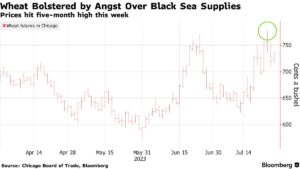A prolonged military conflict in the Middle East could potentially upend key commodity markets due to Iran’s control of the Strait of Hormuz, one of the world’s most important trade…
Russia Fires Missiles in Odesa Region From Black Sea Submarine, as NATO Steps Up Patrols
Reuters News reported today that, “Russian forces struck port infrastructure in Ukraine’s Odesa region in an overnight missile attack, killing a security guard and damaging a cargo terminal, the region’s governor said on Thursday.
“Odesa’s ports have been regular targets for Russian attacks since Moscow withdrew on July 17 from a U.N.-brokered deal that allowed Ukrainian grain to be exported via the Black Sea.
“Before the latest attack, Ukrainian Deputy Prime minister Oleksandr Kubrakov said Russian air strikes had damaged 26 port infrastructure facilities and five civilian vessels in the previous nine days. He gave no further details of the damage.”
The Reuters article indicted that, “Odesa Governor Oleh Kiper said Russia fired Kalibr missiles at an unspecified port from a submarine in the Black Sea in the overnight attack. He said a security building had been destroyed and two cars damaged.
“Ukraine’s air force said two missiles were fired in the attack, and that it had been unable to shoot them down, but that air defences had shot down eight drones that Russia launched to attack other regions of Ukraine overnight.”
Also today, Bloomberg writer James Poole reported that, “Wheat futures climbed as Ukraine said Russia fired two Kalibr cruise missiles from a submarine in the Black Sea at Odesa region port infrastructure, damaging equipment at a cargo terminal and increasing concerns over Black Sea grain supplies.”

“The attacks and threats by Moscow to target vessels in the Black Sea heading for Ukraine, along with potential tit-for-tat retaliation by Kyiv, have increased supply risks and pushed wheat prices to the highest in five months this week,” the Bloomberg article said.
Important meeting of the #NATO-#Ukraine Council. We condemn Russia's withdrawal from the grain deal, its cynical weaponisation of hunger, and its dangerous actions in the Black Sea. #NATO is united — Allies continue to step up for Ukraine, and increase vigilance in the region.
— Jens Stoltenberg (@jensstoltenberg) July 26, 2023
Meanwhile, Financial Times writers Henry Foy, John Paul Rathbone and Felicia Schwartz reported yesterday that, “Nato will increase air force patrol flights and drone deployments in and around the Black Sea, warning that Russia’s threats against civilian ships and attacks on Ukraine’s ports have ‘created new risks for miscalculation and escalation.'”
It was an honor to open the first meeting of the #NATO-#Ukraine Council initiated by @ZelenskyyUa. It's important to hear a direct condemnation of the Russian Federation's withdrawal from the grain deal and the use of hunger as a weapon. In the last 9 days alone, 26 port… pic.twitter.com/N8B4NGKp1l
— Oleksandr Kubrakov (@OlKubrakov) July 26, 2023
The FT article explained that, “Russian attacks on grain silos and port infrastructure on the Black Sea coast and the Danube river, which forms Ukraine’s border with Nato member Romania, along with its withdrawal from the grain export deal, have pushed up wheat prices, renewing concerns about food inflation.”
Russia is hell-bent on preventing Ukrainian grain from reaching global markets.
— Ambassador Linda Thomas-Greenfield (@USAmbUN) July 26, 2023
It unilaterally suspended its participation in the Black Sea Grain Initiative. And now, it is attacking Odesa and other port cities.
The UN Security Council cannot be silent. It is time to act.
Foy, Rathbone and Schwartz added that, “Linda Thomas-Greenfield, US ambassador to the UN, said one of Russia’s attacks this week destroyed 60,000 tonnes of grain, enough to feed more than 270,000 people for a year. She also said Moscow’s attacks on Chornomorsk, a port south of Odesa which facilitates nearly 70 per cent of Ukrainian wheat exports to developing countries, will take at least a year to repair.”
President Putin continues to wage war on the world’s food supply.
— Ambassador Linda Thomas-Greenfield (@USAmbUN) July 24, 2023
This is having devastating consequences for people in dire need. pic.twitter.com/CpZI8643V1
Reuters also reported yesterday that, “NATO said on Wednesday it was stepping up surveillance of the Black Sea region as it condemned Russia’s exit from a deal assuring the safe passage of ships carrying Ukrainian grain.
“The announcement came after a meeting of the NATO-Ukraine Council, a body established earlier this month to coordinate cooperation between the Western military alliance and Kyiv.”
Elsewhere, Wall Street Journal writers Ann M. Simmons and Gabriele Steinhauser reported today that, “At a high-profile meeting in St. Petersburg beginning Thursday with top officials from dozens of African nations, Russian President Vladimir Putin will be under pressure to reassure some of Russia’s closest allies that his war in Ukraine hasn’t compromised the Kremlin’s ability to provide military and political support to the continent.”
The Journal article pointed out that, “The fate of a U.N.-brokered grain deal will be a central topic at the summit. Last week, Russia pulled out of the agreement with Ukraine and Turkey that permitted Ukraine—one of the biggest producers of farm goods—to ship corn, wheat, sunflower oil and other goods from its ports.
Grain prices rose as anticipation of Russia’s withdrawal mounted, and since the day of Moscow’s announcement, corn and wheat futures have climbed 10.5% and 11.7% respectively.
“The deal’s collapse rattled African nations that have struggled with food insecurity and soaring agricultural prices since the start of the Ukraine war.
“Tensions over the grain deal could be sharpest with Egyptian President Abdel Fattah Al Sisi, who will be present at the summit. His country, one of the world’s top importers of wheat, has been hit hard by the economic fallout of the war. Since the start of the conflict, Egypt has scrambled to replace Ukrainian grain with supplies from other countries, including Russia, and is already suffering from 60% food inflation.”





